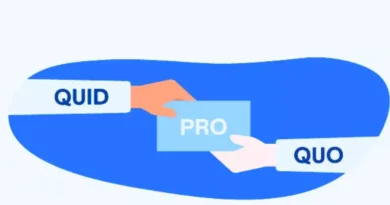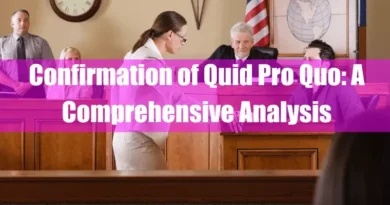Is Quid Pro Quo Illegal in Everyday Life
Quid pro quo, meaning “something for something,” is not inherently illegal in everyday life. It is a common aspect of many legal transactions, such as business contracts where goods or services are exchanged. However, it becomes illegal when the exchange involves improper or unethical elements. For instance, in the workplace, if a supervisor demands sexual favors in return for job benefits like promotions or raises, it constitutes quid pro quo sexual harassment, which is prohibited under laws like Title VII of the Civil Rights Act of 1964. Similarly, in political or public sectors, offering something of value to a public official in exchange for favorable actions is considered bribery and is illegal. Therefore, while reciprocal exchanges are generally lawful, they cross into illegality when they involve coercion, discrimination, or corruption.
Takeaways
| Key Points |
|---|
| Quid pro quo, or the exchange of something for something else, is common and generally legal in everyday life when it involves transparent and consensual interactions—such as business partnerships, professional networking, or reciprocal community support—but becomes illegal when it includes coercion, bribery, discrimination, or abuse of power. |
| In professional and workplace settings, quid pro quo harassment—like demanding sexual favors in exchange for job benefits—is strictly prohibited under laws such as Title VII of the Civil Rights Act, which also protects employees from retaliation and provides avenues for legal recourse. |
| In politics and government, quid pro quo crosses into illegality when campaign contributions or gifts are directly tied to official acts, as clarified by U.S. bribery laws that require explicit agreements to establish corruption. |
| Businesses must avoid unethical practices like insider trading or secretive exchanges that violate securities regulations, while educational and social institutions must ensure that unspoken expectations or favoritism do not undermine fairness or lead to legal risk. |
| Courts determine the legality of quid pro quo based on factors like intent, consent, coercion, and evidence, with violations potentially resulting in both civil and criminal penalties—making it essential to uphold ethical standards across all sectors. |
What Does “Quid Pro Quo” Mean?
“Quid pro quo” is a Latin term that translates to “something for something.” It refers to an exchange where one party provides a good, service, or favor with the expectation of receiving something of comparable value in return. This concept is foundational in various transactions, emphasizing mutual benefit and reciprocity.
Understanding Quid Pro Quo in Everyday Contexts
Common Examples in Daily Life
In daily interactions, the quid pro quo manifests in numerous ways. For instance, a local bakery might supply a nearby café with fresh pastries each morning. In return, the café promotes the bakery to its customers, creating a mutually beneficial relationship where both businesses experience increased sales and enhanced brand recognition.
Another example is professional networking, where individuals exchange contacts or introductions, expecting similar assistance in the future. Such exchanges are generally considered ethical and are integral to building professional relationships.

Distinguishing Fair Exchange from Coercion
While many quid pro quo arrangements are ethical, it’s crucial to differentiate between fair exchanges and those involving coercion. An exchange becomes problematic when one party uses their position of power to demand something inappropriate or when the terms are exploitative. For example, if a supervisor implies that an employee’s job security depends on personal favors, this crosses ethical and legal boundaries.
Cultural and Social Norms Around Reciprocity
Cultural and social norms significantly influence perceptions of quid pro quo. In some cultures, reciprocal exchanges are customary and foster community bonds. However, in other contexts, such exchanges might be viewed with suspicion, especially if they resemble favoritism or corruption. Understanding these nuances is essential to navigate social and professional interactions appropriately.
Legal Overview
When Is Quid Pro Quo Legal?
Quid pro quo arrangements are legal when they involve transparent and consensual exchanges without any form of coercion or violation of laws. For example, business contracts where services are exchanged for payment are standard and lawful. Such agreements are foundational to commercial transactions and are enforceable under contract law.
When Does It Become Illegal?
Quid pro quo becomes illegal when it involves elements like bribery, extortion, or discrimination. For instance, offering money to a public official in exchange for favorable treatment constitutes bribery, which is a criminal offense. Similarly, in the workplace, conditioning employment benefits on sexual favors is unlawful. These actions violate ethical standards and legal statutes designed to protect individuals from exploitation and corruption.

Key U.S. Laws Involved
Several U.S. laws address illegal quid pro quo arrangements:
- Title VII of the Civil Rights Act of 1964: This federal law prohibits employment discrimination based on race, color, religion, sex, or national origin. It encompasses provisions against sexual harassment, including quid pro quo scenarios where employment decisions are contingent upon submission to sexual advances.
- Bribery Laws (18 U.S.C. § 201): These statutes make it illegal to offer or accept anything of value to influence the actions of public officials. Such laws are vital in maintaining the integrity of public administration and preventing corruption.
Quid Pro Quo in the Workplace
Legal Definition of Quid Pro Quo Harassment
In the workplace, quid pro quo harassment occurs when a person in authority demands sexual favors in exchange for job-related benefits or threatens negative consequences for non-compliance. This form of harassment is explicitly prohibited under Title VII of the Civil Rights Act of 1964.
Real-World Case Examples
Real-world instances of quid pro quo harassment have been documented in various legal cases. For example, in the case of Fox v. Gaines, the court recognized that sexual harassment, including quid pro quo harassment, is actionable under the Fair Housing Act, provided the plaintiff demonstrates that she would not have been harassed but for her sex.
How Employers Handle Complaints
Employers are responsible for maintaining a workplace free from harassment. Upon receiving a complaint of quid pro quo harassment, employers typically:
- Conduct Prompt Investigations: Initiate thorough and impartial inquiries into the allegations.
- Implement Interim Measures: Take steps to protect the complainant during the investigation, such as reassigning the alleged harasser.
- Enforce Disciplinary Actions: If the investigation confirms misconduct, impose appropriate disciplinary measures, including employment termination.
These actions demonstrate the organization’s commitment to a safe and respectful work environment.
Rights and Protections for Employees
Employees have the right to work in an environment free from harassment. Protections include:
- Legal Recourse: The ability to file complaints with bodies like the Equal Employment Opportunity Commission (EEOC).
- Anti-Retaliation Provisions: Laws that prohibit employers from retaliating against individuals who report harassment.
- Access to Support Services: Availability of counseling and legal assistance to address and navigate harassment issues.
Understanding these rights empowers employees to take action against inappropriate conduct and seek justice.
Quid Pro Quo in Politics and Government

Bribery and Corruption Laws
Quid pro quo arrangements can cross into illegality in the political arena when they involve bribery or corruption. Under U.S. federal law, bribery is defined as offering or receiving something of value to influence an official act. The Supreme Court has clarified that for a quid pro quo to be considered bribery, there must be an explicit promise or agreement to perform an official act in exchange for something of value.
Campaign Contributions vs. Illegal Favors
Campaign contributions present a nuanced challenge. While donating to political campaigns is legal, it becomes problematic when contributions are made with the expectation of specific official actions in return. The Supreme Court has ruled that only explicit exchanges—where a contribution is directly tied to a specific official act—constitute illegal quid pro quo arrangements.
High-Profile Legal Cases and Outcomes
Several high-profile cases have highlighted the complexities of quid pro quo in politics. For instance, allegations against former President Donald Trump suggested he sought substantial campaign contributions from oil executives in exchange for favorable energy policies. Such cases underscore the fine line between legal and political support and unlawful exchanges.
Quid Pro Quo in Business Transactions
Vendor Agreements and Mutual Deals
Quid pro quo is a foundational principle underpinning contracts and agreements in business. Parties exchange goods, services, or value to ensure mutual benefit, a concept closely tied to “consideration” in contract law. Examples include bartering arrangements or service exchanges where each party receives something of comparable value.
Insider Trading and Ethics Violations
However, quid pro quo becomes problematic in business when it involves unethical practices like insider trading. Sharing confidential information in exchange for personal gain violates securities laws and ethical standards, leading to legal consequences and reputational damage.
Regulatory Compliance Considerations
Businesses must navigate quid pro quo arrangements carefully to ensure compliance with regulations. Transparency, documentation, and adherence to legal standards are crucial to avoid allegations of impropriety or corruption.
Educational and Social Settings

Favoritism in Schools and Universities
In educational institutions, quid pro quo can manifest as favoritism, where students or staff receive preferential treatment in exchange for favors. Such practices undermine meritocracy and can lead to legal challenges, especially if they involve discrimination or harassment.
Volunteer Work and Unspoken Expectations
In social settings, volunteers may feel pressured to perform tasks with the expectation of future benefits, such as employment opportunities. While not always illegal, these unspoken quid pro quo arrangements can create ethical dilemmas and should be managed with clear communication and policies.
How Courts Determine Illegality
Intent, Consent, and Coercion
Courts assess the legality of quid pro quo arrangements by examining the intent behind the exchange, the presence of consent, and any elements of coercion. An arrangement entered into voluntarily and transparently is more likely to be deemed legal, whereas those involving coercion or hidden agendas may be considered unlawful.
Evidence Requirements
Concrete evidence is required to prove an illegal quid pro quo, such as documented communications or witness testimonies that demonstrate an explicit agreement to exchange favors for official acts. The burden of proof lies with the party alleging misconduct.
Civil vs. Criminal Implications
Illegal quid pro quo arrangements can lead to both civil and criminal consequences. Civil cases may result in penalties like fines or restitution, while criminal cases can lead to imprisonment and more severe sanctions, depending on the nature and severity of the offense.
Understanding the nuances of quid pro quo across different sectors is essential for maintaining ethical standards and legal compliance. While mutual exchanges are a part of everyday life, ensuring they are conducted transparently and within legal boundaries is crucial to uphold integrity and trust in various institutions.
How to Identify and Avoid Illegal Quid Pro Quo
Quid pro quo, meaning “something for something,” is common in many aspects of life. However, it becomes illegal when it involves coercion, discrimination, or unethical exchanges, especially in workplaces, politics, or public services. Recognizing and avoiding such situations is crucial for individuals and organizations.
Red Flags to Watch For
Identifying illegal quid pro quo involves being alert to certain warning signs:
- Conditional Offers: When benefits like promotions or job security are tied to personal favors or inappropriate requests.
- Power Imbalance: Situations where someone in authority uses their position to demand something in return for professional advantages.
- Unwelcome Advances: Repeated, unsolicited requests that make one feel uncomfortable or pressured.
- Implicit Threats: Suggestions that non-compliance could lead to negative consequences, such as demotion or termination.
- Lack of Transparency: Deals or agreements that are not documented or are kept secret, especially when they involve exchanges of favors.
Tips for Individuals and Businesses
To prevent illegal quid pro quo:
- For Individuals:
- Stay Informed: Understand your rights and what constitutes inappropriate conduct.
- Document Incidents: Keep records of any questionable interactions, including dates, times, and details.
- Seek Support: Talk to trusted colleagues, HR, or legal advisors if you feel something is amiss.
- For Businesses:
- Implement Clear Policies: Establish and communicate policies against harassment and unethical practices.
- Provide Training: Educate employees about acceptable conduct and how to report concerns.
- Encourage Open Communication: Create an environment where employees feel safe to voice concerns without fear of retaliation.
When and How to Report Concerns
If you suspect illegal quid pro quo:
- Internal Reporting: Report the issue to your organization’s HR department or designated compliance officer.
- External Reporting: If internal mechanisms are ineffective or unavailable, contact external bodies such as the Equal Employment Opportunity Commission (EEOC) or relevant legal authorities.
- Legal Consultation: Seek advice from legal professionals to understand your options and rights.
Conclusion
While quid pro quo arrangements are part of everyday interactions, it’s essential to distinguish between lawful exchanges and those that are unethical or illegal. By staying informed, vigilant, and proactive, individuals and organizations can foster environments of integrity and respect.
FAQ
Is it illegal to trade favors with friends?
No, exchanging favors with friends is generally legal and common. It becomes problematic if the exchange involves coercion or discrimination or violates specific laws or policies.
What should I do if I suspect quid pro quo harassment?
Document the incidents, report them to your organization’s HR department, and seek legal advice if necessary. External bodies like the EEOC can also be contacted for assistance.
Can I get in trouble for offering a small gift in return for help?
Offering small tokens of appreciation is usually acceptable. However, depending on the context, if the gift is intended to influence decisions or actions inappropriately, it could be considered unethical or even illegal.









